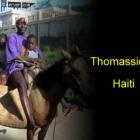ADVERTISEMENT
Illegal Immigration - Haiti Observer Blog
Illegal Immigration, Haiti Observer Blog. Read the following articles about Illegal Immigration
Black Immigration Network wants implementation of Haitian Family Reunification
The Black Immigration Network (BIN) is fighting the Obama administration (OA) on its immigration policies. In 2010 a cataclysmic earthquake took 250,000 Haitian lives and caused displacement of many more millions from their homes. Families have been torn asunder, yet to be reunified. BIN has written Obama, pressing for the Department of Homeland Security (DOHS) to create and put into action a Haitian Family Reunification Parole Program. "The time to . . . reunite Haitian-Americans with . . . family members is now," the letter said in part.
A secondary issue is deportation of immigrants--387,000 of them--in the last five years. Just weeks after the quake, the OA deported 250-plus immigrants, some of whom were deathly ill. The Florida Center for Investigative Reporting discovered OA went against its policy of finding other ways to avoid deportation under life-threatening and humanitarian emergencies. DOHS has issued 110,000 visas for reunification of families, but people are on a waitlist, extending at least 12 years.
Over 100 Haitians deported every day from Dominican Republic
In just 30 days, over 3,100 Haitians were deported from the Dominican Republic, a record taken from the Dajabon province only. This number shows that an estimated 100 to 150 people, most of whom are pregnant women, are deported from the territory every day after trying to gain illegal access into the country.
Women enter the Dominican Republic hoping to give birth there and have their children registered as a citizen of the more prosperous country, but this shows the high level of misinformation surrounding the National Plan for Regularization of Foreigners (PNRE).
Obama Administration approved Haitian Family Reunification Parole program
Major policy shift announced by the Obama Administration toward Haitian Immigration in the US. On October 17, 2014, which is the day Haiti founding father Jean-Jacques Dessalines was assassinated in Pont Rouge, the Obama administration issued an executive Order approving the Haitian Family Reunification Parole program.
Beginning January 2015, U.S. Department of Homeland Security will implement a Haitian Family Reunification Parole (HFRP) Program to expedite family reunification for eligible Haitian family members. It is expected to cover over 5,000 Haitians currently living in Haiti.
Under this new Haitian Family Reunification Parole program, some people who have been waiting for years in Haiti will be allowed to travel and wait in the US instead for their legal status to be adjusted. While in the US, these people will be allowed to function and work legally.
Haitian migrants in Dominican Republic lack documents to get legal status
Because Haiti suffers the reputation of being the poorest nation in the western hemisphere, it has spurred hundreds of thousands of Haitian migrants to cross over the border into the Dominican Republic (DR) seeking jobs. The DR, seeking to implement immigration control, has started a program to give resident status to Haitian migratory workers, who have been in the country prior to October 2011. The DR is asking for a Haitian identity card, passport, or birth certificate. The problem is the Haitian government's inertia in processing requests for the identity documents.
Haitians have not had an easy go of it in the Dominican Republic, but they direct their ire at Haiti's bungling bureaucracy. The immigration authorities are imposing a fee of $60 for a new birth certificate, voter ID, and passport. The fee is well beyond the means of migrant workers whose take-home pay amounts to only five dollars per day.
An Answer to those who say Haitians should not risk their lives on Boat to reach the US
Once again, we have learned that some Haitian migrants perished at sea or as their body came ashore on the coast of Florida, the Bahamas or some islands near by. Often you hear: " The U.S. Coast Guard says an overloaded sailboat carrying migrants from Haiti has overturned and at least 10, 20 30, 40, 50,.... people have reportedly died.
Why do Haitians continue to risk their lives?
Has the information been published in Haiti, in the regions where those trips are being organized?
Do Haitian really know the risk?
They most pay those smugglers some good money. Why can't they use that same money to start a business in their own country instead?
Haitians Sentenced on Immigration Charge in Pointe-A-Pitre, Guadeloupe
Four Haitians involved in the illegal immigration network were arrested in Pointe-A-Pitre, Guadeloupe during the third week of March 2014. The four Haitians hauled by the official were Widberley Predestin (26), Jean Louis (33), Ismick Premier (35) and Jean Vil (36). They were sentenced by the Criminal Court of Pointe-à-Pitre (Guadeloupe) with terms varying 3 to 5 years.
The Border Police (PAF or Police de l'Air et des Frontières) has estimated that their network had landed more than 30 immigration landing operation involving 500 to 600 people (mainly Haitians and a few Dominicans) in the past one year. Their investigation suggests that these illegal immigrants have paid between US$ 4000 and US$ 5000 per trip from Hispaniola Island to the Dominican Republic. In addition, they had to pay US$ 200 to US$ 600 as passages between Dominica and South Basse-Terre (Guadeloupe). Thereafter, they used to pay further €50 to €100 before being taken into a house in Petit-Bourg where they could contact their family to bring more money, if needed.
Turks and Caicos to use drone to fight Haitian illegal immigration
The Turks and Caicos Islands (TCI) are having a problem with the migration of Haitians entering their country. To curb and decrease the numbers of Haitian immigrants, TCI Premier Rufus Ewing announced to the news media TCI wants to begin a drone program. They will be partnering with both Britain and Bahamian governments to achieve their objective.
Premier Rufus set forth the steps their government will implement in 2014, to increase TCI's border control and manage the immigration problem. TCI's approach is two-fold: ramping up its reconnaissance and monitoring coastal borders as well as constant flyovers of border areas.
United States history of maritime interdiction particularly Haitian Boat People
The United States has a history of forbidding foreign boats from entering its territories and reaching its coastline, particularly boats from Haiti and Cuba. Originally, in 1981 the U.S. had an agreement with Haiti which allowed the boarding of a vessel. Those forbidden at sea were interviewed to determine their status as a refugee. Upon discovery of any violations, the vessel was sent back to Haiti after notifying the Haitian government. When the U.S. stopped abiding by this practice, the agreement became terminated in 1994. However, the United States has continued to forbid entrance of Haitian vessels.
Edwidge Danticat and the Haitian Immigrant Experience
Haitian author Edwidge Danticat's new novel Claire of the Sea Light is the Wilmette Public Library's official selection for its 2014 "One Book, Everybody Reads" community program. Danticat, who immigrated to New York City from Haiti with her parents at 12, has been the recipient of every major literary award that can be bestowed on her. She has been on top-ten, best book, best fiction book lists, as well as the Washington Post's 2013 Notable Fiction list.
Claire of the Sea Light limns the Haitian immigrant life, its history, culture, and the people themselves. Several themes weave their way through the magical storytelling of Danticat's deft characterization of cultural roles in the immigrant community. A story of a young Haitian girl, who is orphaned by her father in expectation she will be better taken care of; the story elliptically traces Claire's experiences back to her old life in the tiny fishing hamle,t where she once lived.
Marleine Bastien, on the Frontlines of Immigration Reform
Marleine Bastien, born in rural Pont-Benoit, Haiti, is a champion of immigrant rights. Her calling in life came early; when at the tender age of eight, she was already ministering to underfed and cast-off children at a Deschapelles medical facility. Her father, a rice and mango grower, was her biggest influence, a self-taught medic, who provided medical treatment to suffering village people.
Marleine Bastien did more than provide food aid and a comforting presence; she also helped them become literate. The biggest reward for her was when a child, who was so frail they couldn't manage a smile, beamed at her.
Our objective is to share with you news and information about Haiti and the people of Haiti. Traditions, habits and the way we were or grew are alive in this site. We highly recommend that you Subscribe to our Newsletter and also share with us some of the things that are memorable and made us unique people.

 Thomassique, Haiti
Thomassique, Haiti  Maissade, Haiti
Maissade, Haiti  Haitians are a Proud People
Haitians are a Proud People  Saint Marc, Haiti
Saint Marc, Haiti  Black Friday Shopping Season
Black Friday Shopping Season